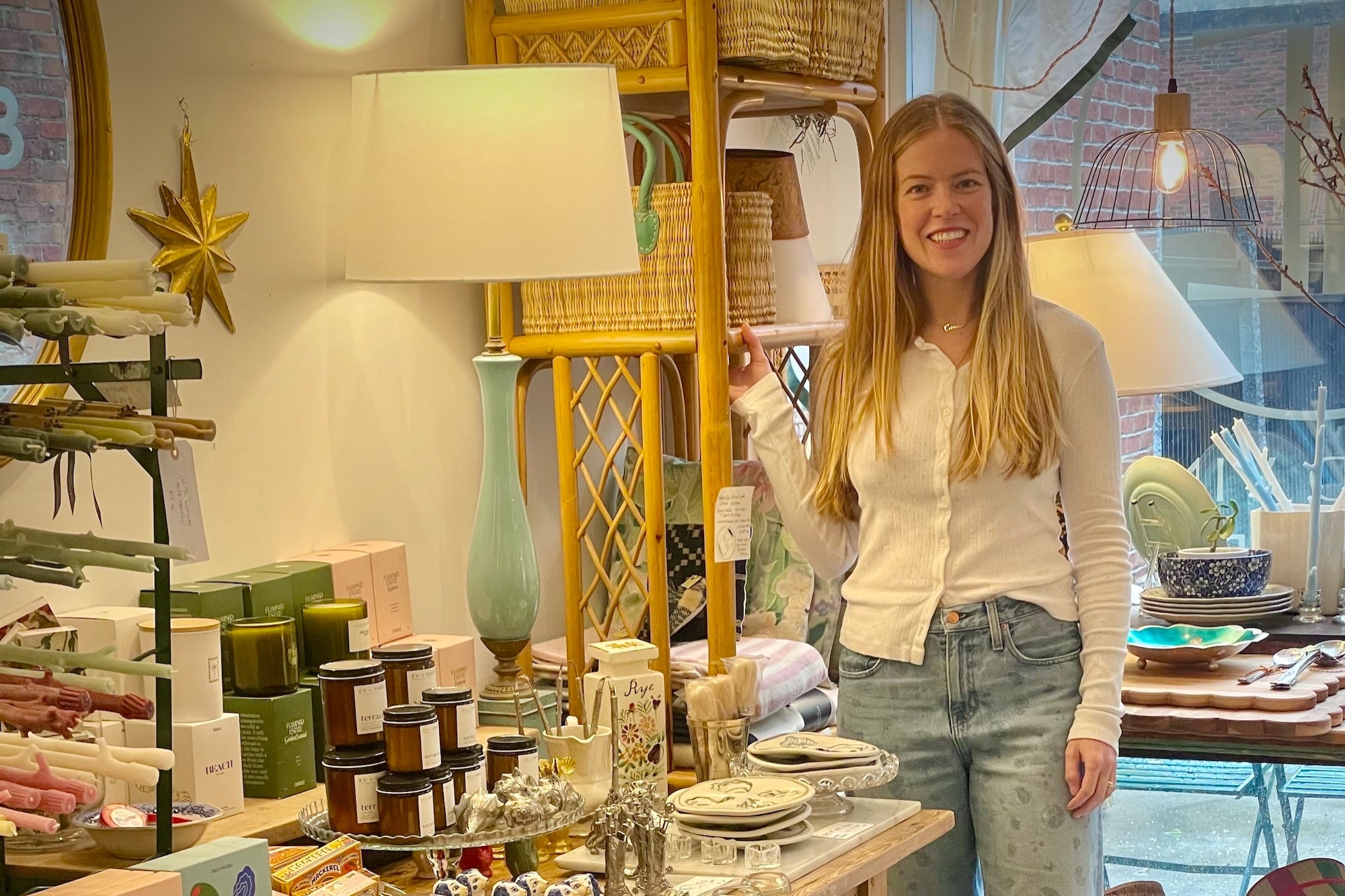When Eileen Carew decided to open her own home decor store a year ago, she took on that role that many entrepreneurs find themselves in: the do-everything person. “I’m the founder, curator, shopkeeper, and strategist,” she told Entrepreneur. “Every aspect, from sourcing inventory to designing the customer experience, reflects my passion for interiors and the craft of shopkeeping.”
Carew’s team has since expanded to include two additional team members, allowing her to fully step into the CEO role, allowing her to “focus on moving us forward, rather than the day-to-day operations.”
Here’s more about how Carew built her business and how she attracts loyal customers in-store and online.
Please give the elevator pitch of your business.
Emptio is a new and vintage home décor boutique situated in the historic town of Portsmouth, New Hampshire, and also has a large online footprint. We curate pieces that blend modern design with vintage character, ensuring every item has meaning and intention. We are focused on offering an exploratory experience for our community of customers, who care deeply about the personality of their homes and want everyday items to bring them fulfillment. We love inspiring customers to find pieces that make their homes feel deeply personal and heighten their lives. You can find us at 98 Penhallow Street, Portsmouth, NH 03801, and online at emptioportsmouth.com.
Related: ‘Coffee Is Life’: NBA All-Star Jimmy Butler’s Side Hustle Is Now a Brick-and-Mortar Shop
What inspired you to create Emptio?
Prior to launching Emptio, I spent over a decade working in corporate accounting, primarily in SEC reporting for publicly traded companies, holding various management roles. While I discovered a love of project management, I found myself craving a creative outlet. Over time, I realized that I wanted to manage the ultimate project — a company. That realization began to take shape when I stumbled upon the podcast How’d She Do That?, which features stories of female entrepreneurs. Hearing their journeys planted a seed of confidence.
So what was the first real step to making it happen?
Around that time, I had just purchased my first home and found myself absorbed in interior design and collecting — passions I’ve carried since childhood. The pivotal “aha moment” came when I participated in a weekend vintage market. There, I experienced the joy of shopkeeping and knew I wanted to create a space where people could discover their personal style, celebrate individuality, and move away from cookie-cutter trends. That vision became the foundation for Emptio—a place where creativity, quality, and self-expression come together.
Related: He Turned a College Project Into a $100 Million Luxury Fashion Brand: ‘My Grandma Taught Me How to Sew’
When did you know that this was going to work?
The first time I sold our most expensive item was a game-changing moment for the business. When we opened, I decided to showcase an English antique table priced at $2,500—a special piece that embodied our brand’s essence and set the tone for the store by signaling to customers the kind of quality they could expect. Not long after we opened, a woman came in and purchased it on the spot. That sale validated our proof of concept, reshaped my perspective on inventory, and solidified my belief in investing in pieces. It taught me that when you view your inventory as an asset, rather than a cost, and focus on items that are genuinely special, the demand will follow. That moment turned my initial worries into a firm conviction: great things attract great buyers.
What advice would you give entrepreneurs looking to open a brick-and-mortar?
Be strategic with your space – It’s important to be aware of sales per square foot and make sure that you utilize the space in a way that not only enhances customer experience, but also ensures efficient inventory flow to maximize sales potential. And prioritize your online presence. When I opened the store, I viewed websites as a necessary evil, given that they contribute to approximately 15% of brick-and-mortar store sales. Once I learned that a website shouldn’t be a stagnant thing, it became more interesting to me creatively, and now I fully embrace it — and let’s face it, it helps support the reality of the physical space.
Besides revenue, what are some other ways you are monitoring success?
I’m very proud that approximately 20% of our in-person customers return to the store, which is about double the average for brick-and-mortar stores. I attribute that largely to our ever-changing selection of products, as well as our employees. This statistic tells us that we’ve built a space and relationships that are truly special and lasting.
Related: How to Get Customers in Your Store and Drive Traffic to Your Website
What does the word “entrepreneur” mean to you?
Being an entrepreneur is about identifying something missing in the market and feeling a compulsion to bring it to life. For me, it was about blending a love for home with the art of shopkeeping, creating an environment that’s both well-curated and inspiring.
What is something many aspiring business owners think they need that they really don’t?
I think business owners can get caught in aesthetics. For shop owners specifically, this may mean too much focus on décor and design before they have selected critical software to ensure operations run smoothly. A visually appealing space is important and something I’m passionate about, but I think investing in inventory management and customer experience is more critical to the success of the business.
Is there a particular quote or saying that you use as personal motivation?
“Everything in moderation, including moderation.” I love the play on an old saying and appreciate the reminder that balance matters, and also taking risks and stepping outside the box can be very important and impactful, whether in business or in life.
When Eileen Carew decided to open her own home decor store a year ago, she took on that role that many entrepreneurs find themselves in: the do-everything person. “I’m the founder, curator, shopkeeper, and strategist,” she told Entrepreneur. “Every aspect, from sourcing inventory to designing the customer experience, reflects my passion for interiors and the craft of shopkeeping.”
Carew’s team has since expanded to include two additional team members, allowing her to fully step into the CEO role, allowing her to “focus on moving us forward, rather than the day-to-day operations.”
Here’s more about how Carew built her business and how she attracts loyal customers in-store and online.
The rest of this article is locked.
Join Entrepreneur+ today for access.








